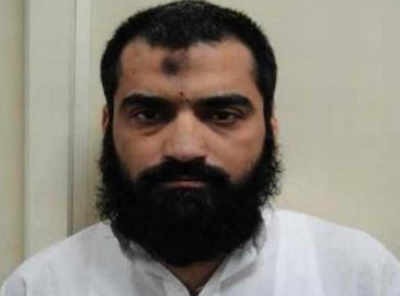- News
- India News
- Aurangabad arms haul case: Abu Jundal, others held guilty
Trending
This story is from July 28, 2016
Aurangabad arms haul case: Abu Jundal, others held guilty
The special Maharashtra Control of Organised Crime Act (MCOCA) court on Thursday held Sayed Zabiuddin Ansari alias Abu Jundal and others gulity in the 2006 Aurangabad arms haul case. Jundal was deported to India from Saudi Arabia.

The special Maharashtra Control of Organised Crime Act (MCOCA) court on Thursday held Sayed Zabiuddin Ansari alias Abu Jundal and others gulity in the 2006 Aurangabad arms haul case. Jundal was deported to India from Saudi Arabia.
Key Highlights
- Jundal was a key plotter of the 26/11 terror attacks.
- He was deported to India from Saudi Arabia in 2012.
- 22 people were arrested in the Aurangabad arms haul case.
MUMBAI: Sayed Zabiuddin Ansari, alias Abu Jundal, a key plotter of the 26/11 terror attacks, was on Thursday declared guilty in the 2006 Aurangabad arms haul case .
Of 22 accused in the case, the special Maharashtra Control of Organised Crime Act (MCOCA) court on Thursday held 12 guilty. Eight accused were acquitted, one fled during the trial and there will be a separate trial for one who turned approver.
"This was a conspiracy after the 2002 Gujarat riots to eliminate then Gujarat CM Narendra Modi and VHP leader Pravin Togadia," the MCOCA court said.
On May 8, 2006, a Maharashtra ATS team arrested three terror suspects and seized 30kg of RDX, 10 AK-47 assault rifles and 3,200 bullets after chasing 2 cars on the Chandwad-Manmad highway near Aurangabad .
He was deported to India from Saudi Arabia in 2012.
The special court here framed charges against the 22 arrested accused in August 2013. During the trial, the prosecution examined 100 witnesses while defence lawyers examined 16.
The trial was stayed by the Supreme Court for a while after one of the accused challenged the constitutional validity of certain provisions of MCOCA. The stay was vacated in 2009.
In August last year, the Bombay high court directed the lower court to expedite the trial.
Of 22 accused in the case, the special Maharashtra Control of Organised Crime Act (MCOCA) court on Thursday held 12 guilty. Eight accused were acquitted, one fled during the trial and there will be a separate trial for one who turned approver.
"This was a conspiracy after the 2002 Gujarat riots to eliminate then Gujarat CM Narendra Modi and VHP leader Pravin Togadia," the MCOCA court said.
On May 8, 2006, a Maharashtra ATS team arrested three terror suspects and seized 30kg of RDX, 10 AK-47 assault rifles and 3,200 bullets after chasing 2 cars on the Chandwad-Manmad highway near Aurangabad .
Jundal, a Lashkar oprative, was at the time apparently driving one of the cars and got away. The terrorist, who hails from the Beed district of Maharashtra, is said to have driven to Malegaon, after which police say he escaped to Bangladesh and then Pakistan.
He was deported to India from Saudi Arabia in 2012.
The special court here framed charges against the 22 arrested accused in August 2013. During the trial, the prosecution examined 100 witnesses while defence lawyers examined 16.
The trial was stayed by the Supreme Court for a while after one of the accused challenged the constitutional validity of certain provisions of MCOCA. The stay was vacated in 2009.
In August last year, the Bombay high court directed the lower court to expedite the trial.
End of Article
FOLLOW US ON SOCIAL MEDIA











